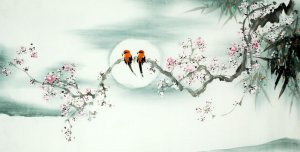
This review may contain spoilers
After I watched The Untamed twice, I watched the donghua and read the novel to get a better grasp of the original story. I understand why some fans may be upset with certain aspects of the drama, but I neither have qualms nor do I compare the medias. After my third rewatch, I decided to write about the drama.
I enjoyed everything, but above all else, I loved and adored the characters. Therefore, this review is more like an appreciative post of my favorites. They are the reason The Untamed is so special and compelling, making it so deserving of its success. We laugh, cry, and learn with these characters as we follow along their journey.
Wei Ying/Wei Wuxian:
WY is the star and highlight during the past for me. People may say he is your typical hero with a savior complex. While this is true, it is not entirely.
WY is guided by one thing and one thing only. During the lantern scene in episode 7, he says, "I wish that I can eliminate evil and protect the weak, always maintaining a clear conscience." Call it a wish, a promise, or a principle. Regardless of the label, it stands against the test of time, residing deeply in WY’s heart. It does not sway under the influence of trivial matters, such as, reputation, politics, or rules. WY is unrestrained in following his heart. He truly embodies “the end justifies the means”, taking it as far as cultivating an unorthodox path and standing against the majority. His dedication and selflessness moves you in ways that make it impossible not to love and cheer for him.
Lan Zhan/Lan Wangji:
LZ is the star and highlight during the present time. People may say he is your typical hero with a cold heart that melts gradually due to his soulmate. While this is true, it is…
LZ lives and breathes Gusu Lan Sect's thousands of rules. He is restrained and stubborn in his ways, not allowing anything or anyone phase him. Or so he thought. Although LZ is the opposite of WY in almost everything, they happen to share the same heart, vowing the same wish. To him, protecting WY is equivalent to keeping that wish alive.
The character development LZ undergoes is nothing new, but the way it is done is simultaneously beautiful, heartwarming, and heart-wrenching. His beliefs, basically his life, is challenged when WY strays from the righteous path that LZ has always known. He questions himself and the ideology he has upheld since young. Does he trust what has been hammered into his brain? Or does he trust the heart of WY he has witnessed? This hesitation makes your heart ache for him as he begins to realize the lines drawn between what is right and wrong and what is black and white may not be so defined after all.
The lines are blurred. The world is, in fact, gray. When WY returns, the fire in LZ burns brighter than ever as he protects WY (in essence, their vow) with a renewed sense of justice and passion. The change in him is a wondrous sight that makes you swoon and wish for a LZ in real life.
Jiang Cheng/Jiang Wanyin:
JC is a misunderstood character. You either like him or hate him. JC’s pride lies in himself and his sect. Because of his noble status as a successor, he is unable to live freely like WY. JC has to care and mind what others say or think. He has a reputation to uphold because his existence reflects Yunmeng Jiang Sect. This burden, his guide, makes him selfish as his behavior is motivated by whether or not something benefits him and/or his sect. At the end of the day, when everyone left him, didn’t he just want WY by his side? He is probably the most realistic character beside from his sister, so I kinda laugh when people despise him. He is human, therefore, he displays anger, grief, and jealousy like we all have at some point in our lives.
Jiang Yanli/ Shijie:
SJ is both a sister and mother to JC and WY, understanding and believing in who they truly are. She is seemingly your typical female character, weak and timid, only capable of cooking lotus root and pork rib soup for her loved ones. Until you mess with her younger brothers… The courage and bravery she showed in episode 25 had me in awe of her strength to overcome her preference to blend into the background and not stand out or up to anyone. Emotions well up inside my chest whenever I hear SJ’s song, Yi Nan Ping, and its instrumental. SJ is too good for us. We are not worthy, and do not deserve her.
Wen Ning/Ghost General:
Our dear cinnamon roll… Loyalty at its finest. WN was just a shy boy, subject to ridicule. Even his sister kept his existence low-key, a way to keep him safe. Then WY walks into WN’s life, and everything changes. His persona of the Ghost General scares everyone out of their wits. I felt sad he was used as a weapon, and committed acts that he would never dream of in his original state. I was in greater agony when he accepted all the hatred and blame as a consequence. He did not fight back. He did not argue that he was not at fault. He simply took responsibility for his actions. And that, to me, is admirable.
The younger generation:
The youngins do not get enough credit. Mainly, I am referring to Lan Sizhui, Lan Jingyi, and Ouyang Zizhen. For the most part, they act as comedic relief. They are snarky in their remarks and extra in their behavior. I enjoyed the display of stark contrast between them and the older generation. The kids undoubtedly heard stories and rumors about the big bad wolf, Wei Wuxian, but it is plainly obvious they took it with a grain of salt. After “Mo Xuanyu” is revealed to be WY, instead of being scared, they trust in the kindness WY has shown them. They are not quick to act solely based on what they have heard, and they do not jump aboard the revenge train just because everyone else is targeting a particular person. What a wonderful indication of how the future is in better hands than it was during WY’s time.
Of course, there were plenty of other supporting characters who were awesome in their own right, but these were my favorites.
“The green mountain won’t change; the flowing water is endless. I’m sure we’ll meet again someday!”
Was this review helpful to you?
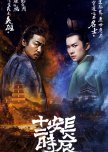
Story:
Admittedly, it's a lot to take in. You're thrown into the middle of the bustling capital Chang'an for 24 hours, and, boy, it's a long, long day. Buckle up 'cause every detail and every face matters. The first half is action-packed, intense, and thrilling. The chase to find the ultimate mastermind and prevent mass casualty is an exciting rush to be in the moment. The plot then slows to unravel the intriguing conspiracy, leaving you speechless and chilled to the bone. Also, in this latter half, it shows the grim reality of politics. Even when an immense threat is upon Chang'an, the various powers, who are supposed to unite to fight against it, are wary of each other and more worried about themselves than the foundation of any regime, the people.
I grew tired of the plot twists revolving the identity of the ultimate mastermind, but the journey of realizing his identity was the least of my worries was... Painful.
I'm not a fan of constant flashbacks. I'd rather have the past shown to me in one go. This drama, however, presents pieces of the past just enough to give you vital information that explains characters' actions. It works out well. Furthermore, you'll slowly understand their dreams and beliefs. The past war the Eighth Squadron fought became one of my favorite parts of the drama. Just see for yourself.
"I am a solider." - A line and its entailments... So beautifully brutal.
Characters:
It's an ensemble cast. Everyone is important whether they're on the side of the conspiracy or not. I enjoyed the morally gray characters because it's realistic. We're all selfish human beings, both good and evil, and that has never changed. As long as something serves our interest, let's go and do it. Some characters, mainly Zhang Xiao Jing and Yu Chang, may seem inhuman with their abnormal strength, but this is forgiven since it adds excitement during the action scenes. Ultimately, there is a lack of character development. These are stubborn characters who are firm in their beliefs. In the span of 24 hours, well, old habits die hard. You do see them gain some enlightenment though.
Tidbits:
It's aesthetically pleasing. I found the street scenery of Chang'an absolutely mesmerizing. I appreciated the consistency of blood, cuts, and bruises on the characters in each scene. The fight scenes are a little clumsy but look natural enough. The parkour scenes had me laughing. I felt no strong attachment to any major character. More than any of them, the common people who only had a few scenes or lines captured my heart. And that heart was stomped on over and over again...
Conclusion:
You definitely need to pay attention to every scene to get the full experience. I'd recommend this to anyone who likes to be in pain. Yes, I said it. What started as a simple good vs. evil battle. What started as people painted as purely heroes or villains. It turned into something more dark and bleak than I thought it could get. Who you root for in the beginning may not be the same in the end~
Was this review helpful to you?
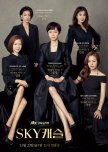
This review may contain spoilers
Overall, it's a solid drama. It's just not what I expected. Maybe I had too high hopes. Perhaps its great potential from the beginning led me to believe its ending would be on par. It was not. I wanted this drama to turn a lot darker than it did.SKY Castle presents itself as a satire, as a critique on South Korea's educational system and patriarchy. It touches on sensitives subjects (especially for SK), such as, mental health, suicide, and emotional abuse. It shows the lengths parents would go for their children to get into the top universities. It comments on helicopter parenting, the stress it induces on children, and how that pressure affects their impressionable minds. There is manipulation and gaslighting.
The ending's saving grace was the very last scene because it showed all these (in my opinion, easy) resolutions to serious, heavy conflicts that moved into happy, cheery nonsense from episode 19 to 20 was, indeed, idealistic. There will still be copycats of Kim Joo Young. There will still be wealthy families searching for coaches and using their money and power to get ahead solely because they are the one percent and that they can. The cycle continues. I am glad they acknowledged this.
I was disappointed with how they wrapped up these characters' stories. I hoped for greater, realistic consequences for their actions and greed. Am I expected to believe their happy endings after watching all their selfish and stubborn selves for hours and hours? After SO MUCH dialogue. After Lee Soo Im's talking of sense that fell onto deaf ears. These parents have a quick change of heart and want to be better parents. What if it's too late?
Playing my own devil's advocate, I can see why the characters' endings make sense. Only after many, extreme situations, the parents finally realize education does not equal happiness. You never know how precious someone is until you lose them. And these parents almost did. That kind of rude awakening forces their change in mentality, though I roll my eyes at it taking deaths and breakdowns for character development to occur. In fact, I didn't want them to change their ways. I wanted them to suffer from being caught up in the world they live in. I would've preferred the drama to follow its dark course until the very end with these characters.
More often than not, I see dramas, especially Kdramas, end happily ever after because they may be afraid of deterring potential viewerships. I thought SKY Castle would be different. If they wanted to shine a light on such dark themes. If they wanted to hit home to South Koreans for being so relatable, they should have gone all the way and hit a home run. I felt like it was a cop out. Don't shy away. Be bold and give me a sad ending. Even though it's just a drama, you've included realistic issues with South Korea and all over the world. Why not dare take that extra step and put them on full blast?
Was this review helpful to you?
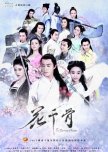
The plot is simple. Everyone is obsessed with someone or something to the point they turn cuckoo. Almost everyone hates HQG, blames her for everything that's gone wrong in their lives, and wants her to die. Multiple powerful men like HQG and want her alive. HQG just wants to be left alone with BZH who wants to protect her just because she is his disciple. I guess…
The flow of the plot is sometimes jumpy. Information is revealed out of nowhere without any hints in the earlier episodes. Disclaimer: I watched the DVD version, whereas the uncut had more episodes. Maybe the missing content could have filled in the blanks, but I don’t care enough to know what it is. I don’t think it’ll help this poor mess in any case.
The first third of the drama is actually bearable and enjoyable. This particular arc depicted a progression of how HQG turned from weak to strong in terms of power. I did like this journey because it’s the usual rise from underdog to top dog. Outside of cultivation, however, HQG regressed to the point of no return, literally.
By episode 20, I questioned why I was still watching and what I was watching. It’s not exactly an epic love story between two people who are tied by fate. If so, they failed to convince me. There was an extreme lack of chemistry between HQG and BZH to even call their relationship remotely romantic. I deduce this is due to how poorly their characters were written. I wasn’t even touched by their teacher/student bond. I watched the lengths they went for each other but felt nothing at all.
A little past the midway point, HQG got even more and more annoying with her obsession over her teacher. She lost her brain cells and made stupid, reckless decisions driven by her persistence to be by BZH’s side. If I did drink and if I played a little game called “Take a shot every time HQG says, ‘Shifu’, then I would’ve quickly died of alcohol poisoning. After finishing the drama, dying before getting to the end does sound quite nice.
The list of pros of JoF is short, riddled with buts. I liked Dong Fang, but, well, you know. I liked the caterpillar (spirit bug), but it turned into a human. I liked the man who liked to be called Jiejie, but he turned a bit meh. I liked the OST, but I wished they added it as background music during scenes more often.
The list of cons is long, longer than I would care to write about. The crux of it all is the unlikeable, one-dimensional characters. They were all annoying in their own right. In some dramas, I could turn a blind eye and pass supporting characters off as endearing. Nope, not in JoF. I could not bring myself to like or root for anyone in this drama. It’s amazing in a horrifying way.
Conclusion: JoF had me looking for a playback speed that exceeded 2. The tearjerker tag doesn’t make sense. Snoozefest fits best.
Was this review helpful to you?

Story/Characters:
The plot moves along quite quickly. There’s enough action in each episode to keep me entertained. More than half the drama was very strong. I felt happiness, excitement, horror, dread, and heartbreak. I love when dramas are able to bring so much out of me. In the later arcs (last 4-5 episodes?), I felt the plot was repetitive in terms of all the fighting and revenge.
The writing for Hwi and Sun Ho could had been better. They had one-track minds, pulling all stops to reach their goals. Sometimes I sighed and wished they saw the bigger picture. Granted, they acted high on emotions. Without giving too much away, their actions, at times, felt illogical and only served to lead towards their ending. Though everyone was morally ambiguous, my heart especially went out to Sun Ho who was cornered into making such extreme decisions alone. While Hwi had a whole squad behind him, Sun Ho merely had one loyal soldier, who surprisingly stole my heart, by his side. Sun Ho was such a heart-wrenching character to watch as he was torn between family and friends, wanting to be acknowledged as a proper son and wanting to protect his friends. I loved him no matter how destructive he evolved into.
Hee Jae was pretty much a bland character. Her existence felt so minuscule. By being delegated as Hwi’s love interest, her significance to the story and potential as the leading female fell straight through the cracks. I wish they had abandoned the romantic line. Hee Jae (and her association with the information-collecting Ihwaru) could have had a much stronger influence on the plot.
How could I not talk about Yi Bang Won. Only in sageuks can you feel compassion for such a notorious historical figure. This portrayal of him is similar to the one in Six Flying Dragons, which I have no qualms about because I enjoy an antihero. The setup of his background does well in leading me to pity him, unable to completely hate his guts for everything that’s gone wrong with the main leads. He is such a fascinating character that demands your attention with his presence.
Acting/Cast:
One thing I appreciated was the solid acting from everyone. I find, especially in sageuks, that the supporting cast members really nail their roles and make them memorable. You either adore them or hate them to the bone. If the character is Yi Bang Won being played by Jang Hyuk, then you will love and hate him with every fiber of your being. Seriously, what a performance by Jang Hyuk.
Chemistry:
Let me preface this by saying romance is absolutely not the focus of My Country. There are more important issues to address in the world these characters live in. With that being said, I found absolutely zero chemistry between Hwi and Hee Jae. Their scenes together felt unnecessary, an afterthought almost. I found the bromance between Hwi and Sun Ho to be much more angsty and compelling. Though their views differed, I could still see and feel their loyalty to one another, and the lengths they would go for each other.
Ending:
Although the bromance in the beginning was strong, Hwi and Sun Ho were apart and at odds for more than half of the drama. So many misunderstandings between the two, but their reunion was short. I’m not sure exactly why I was not bawling my eyes out. Even if I had expected it, I still should’ve at least shed some tears? Alas, I only felt a deep sense of emptiness. I am familiar with the historical events during the time period between near the end of Goryeo and the beginning of Joseon dynasty. As the plot played out, I saw no other option. This may have lessened the emotional impact on me.
Each character has their own sense of what their country should be. They scheme and mostly use their swords do the talking to realize that dream. Even if it means sacrificing themselves, one will not hesitate since their country is something bigger than themselves. The ending is proper. I accept it.
Was this review helpful to you?
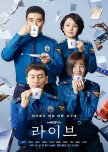
There is so much material to unpack. I never felt like the plot dragged, and there definitely was not a dull moment. Rather on the cases and criminals, there is more of a focus on the ripple effect of a crime. How does it affect the victims and their families? How does society respond and view these victims? How do police officers, whether veteran or rookie, feel as they see these crimes happen day in and day out? I’d put a trigger warning after episode two. A majority of the cases involve sexual assault, rape, and abuse of all types. It is rather graphic, so it may be distressing to see. Its realistic approach shows heinous violence can happen to anyone and anywhere. Oddly enough, I found this drama educational because it touches on conversations, for example, consent, that should be held, especially with parents and their children. I really enjoyed the writing that gives food for thought.
I applaud the cast for their outstanding acting and intense on-screen presence, especially Bae Sungwoo. Their portrayals of ordinary police officers who are simply doing their best to survive and do their job is relatable and realistic. Live continuously reminds us police officers are human beings like you and me. They are daughters and sons to someone, mothers and fathers to others. They are not superheroes who are unperturbed by violence and death. They have weaknesses, too. Not even academy training or decades of experience can completely encase their hearts in stone. I loved how the screenwriter shattered the rookies’ expectations of being a police officer. There is no glory. To wish for a big case to crack in order to achieve merits, it requires a victim, for someone to die or someone to be traumatized. I enjoyed the journey the mentees went through with the help of their mentors who shaped them up to become wiser police officers. I also liked the mini arcs most received because character development is always more than welcomed. I adored the interpersonal relationships among all those in the division. Witnessing the camaraderie slowly built over the duration of the drama warmed my heart. Seeing the officers struggle through the downs of life yet being lifted back up with the help of their fellow colleagues tugged on my heartstrings.
I definitely am someone who watches with my heart rather than brain. Live made me laugh and cry, as I intently followed everyone’s growth. Some parts I simply let pass by with not much thought since I knew they were needed to move the plot and development along. I felt like the police procedures were quite accurate, so there wasn’t anything major to nitpick. The product placements fit well, actually, and I am used to them. With any Korean drama based on crime, I expected the name-calling, boisterous voices, and slapping. These are, I guess, normal when it comes to portraying the police, so they are stuff to keep in mind, if you’ve ever been annoyed with them.
Overall, Live is one of the better ones, of its genre, out there. It shows you the no-frills lives of police officers without mastermind criminals and cat-and-mouse games. I liked how it shined a light on the patrol division, the one that gets to the crime scene first and interacts with the community the most. The officers respond to every single call with the same passion and sense of duty, the very things that may waver when up against the flawed system but remain resilient in the face of protecting their fellow citizens’ lives.
Was this review helpful to you?

Story:
The core focus of the story is to showcase family dynamics fueled by blood purity, filial piety, and social class. Those born under a man’s main wife are considered legitimate, while those under a man’s concubine are illegitimate. Despite either status, one is expected to observe and conduct filial piety under any and all circumstance. One must not, and cannot afford to, offend their superiors in a higher social class than them. Revolving these three main fires, conflicts arise, and are mainly put out through dialogue.
For the most part, the presentation of the plot was told ever so matter-of-factly. There was rarely any over-exaggeration of arguments, discipline, or punishment. It was almost as if the drama shrugged, and said, “This is how things were back during the Song Dynasty.” If there was a dramatic scene, it would be shown comedically (you would know by the accompanying instrumental), almost in a satirical way, inviting the viewers to, yes, laugh at the characters.
The story could feel repetitive. The two main leads, Ming Lan and Gu Ting Ye, are extremely intelligent, meticulous, and calculative. Once they devise and implement a plan, everything goes their way, pawns moving and barking according to how they predicted. When others scheme against them, the leads are able to safely weave themselves out of their enemies’ web by using their wit. Despite the predictable end to all problems, it is interesting to see how the leads set up traps and watch their prey fall in. The drama also does a fantastic job at delivering comedic relief during appropriate times to break up the monotony.
Characters:
One of the drama’s charms is its undoubtedly large cast. Though it may be difficult to recognize and remember everyone, the writing and its conveyance of each supporting character make it easier. Each character has layers of depth, a personality that makes them memorable and human. Everyone, from mere servants to the emperor, has a role in contributing to the plot. The characters are a product of their birth status and social class. Their actions are driven by their desires to seek wealth and a higher class, or to preserve their reputation and lives. If you cast modern thoughts aside and step into these characters’ shoes, it is a joy to watch, especially as some risk it all to achieve their goals.
The main leads are more modern, suiting better with most viewers. They seek justice and happiness, preferring not to be entangled with their families’ struggles, but they soon find out they have no choice but to step up. They may not want conflict, but trouble finds them.
Ming Lan understands how the gears turn in the society she lives in; therefore, she does not overstep the boundaries that have been set around her. Always proceeding with caution and pretending to be a typical young lady from a scholarly family, it is a wild turn when she reveals her true nature to those closest to her in order to uphold justice.
Gu Ting Ye is the eyesore of his maternal and paternal families who covet wealth and a noble title. Blood is not always thicker than water, and GTY gets this rude awakening early on in the drama. Surrounded by people who put on a facade, all he wants is someone who loves and treats him sincerely. It is a heartwarming sight to see how he repays that genuineness.
ML+GTY:
More often than not, I watch female leads start off smart and strong, but when their other half enters the picture, it is as if the female forgets how to think or fight.
Romance is not the drama’s focal point. It is mostly subtle, but when it is explicit, the scenes are both cute and endearing. Ming Lan and Gu Ting Ye are undoubtedly a power couple, probably the best pairing I have ever seen. They communicate, airing out their feelings and thoughts, and support each other in their respective endeavors.
What I like about them the most is the fact they complement each other, never outshining or overshadowing the other. They are equals, fully understanding of each other’s strengths and weaknesses. For example, ML encounters countless of issues, but she solves them all without the help of GTY who trusts in her ability to overcome them. In exchange, ML trusts GTY to save and protect her from danger because she does not know martial arts. The drama is called “The Story of Ming Lan”, so I appreciate how the titular character’s strengths are not diminished due to her partner. Instead, he lets her spread her wings and soar like the phoenix that she is. Ming Lan is given the respect and the spotlight she deserves.
Conclusion:
Overall, I would not say this is a must-watch drama, but I would say to give it a fair chance despite the perhaps overwhelming reasons not to do so. Given the ensemble cast, do expect ZLY and FSF to disappear from time to time. The collective effort of all cast members make this project what it is, a well-rounded and enjoyable drama. It is truly unlike any other.
I like to say, “Long dramas often take you on wonderful journeys.” Do keep that in mind.
Was this review helpful to you?

